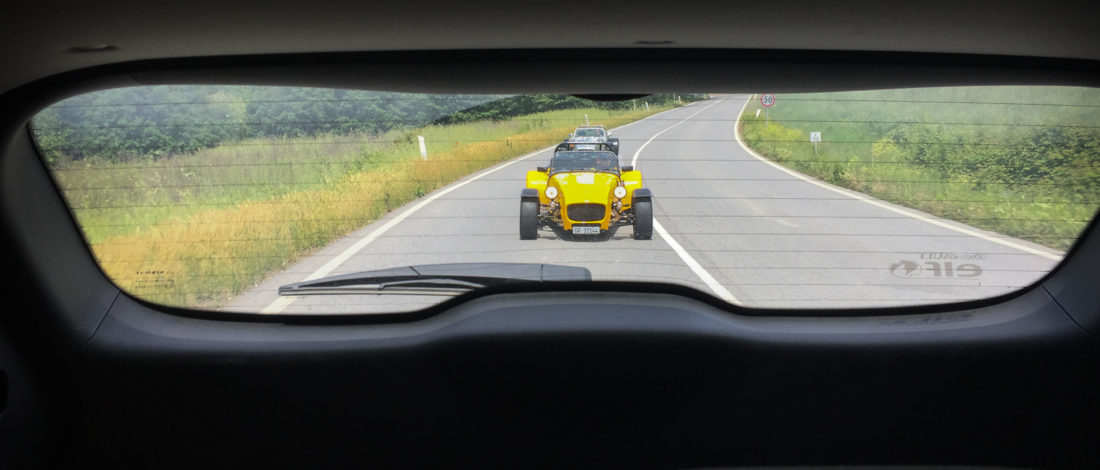
Passing as Italian
(Part 3 of a series on driving in Italy. Photo is out our back window one day when we found ourselves in the middle of the famed Miglia Mille rally on our way to lunch. Full disclosure, both cars did pass us.)
One of the most important things to master to drive well in Italy is the art of passing. The first thing to know is that Italians drive when they drive. There is no drifting along in your lane, thinking of what really should have been said in that meeting, or what to make for dinner. (This generality does not apply if the driver is in an older white or green Fiat Panda. That self-identified group has their own distinct norms and behaviors—the subject of a future Itch.)
The norms of passing are most evident on the autostrada. Rule number one is that you never drive drifting along in the left lane—which is used only for passing. You wait your turn in the right lane behind the car or truck you want to pass, looking in your side mirror while cars blast past, then pull out, pass, and quickly reenter the right lane before another car comes up on your rear madly flashing its lights for you to get out of the way. And know that if you are not regularly being trailed by an irate driver in an Audi flashing lights then you are going far too fast.
Passing on local roads is not an occasional thing but something you do constantly, which I guess has to do with the wider variety of vehicles on the road than what I was used to in America. We contend with the full range of under-powered scooters, three-wheeled vehicles called apes (pronounced “au pey” which in Italian means “bee” — not to be confused with the Vespa, or “wasp”). Then there are the tractors, trucks, and previously mentioned white or green Fiat Pandas. All require passing.
The rules for passing are well-documented and necessary to master in driving school, but nearly nonexistent in practice. It’s up to everyone’s definition of common sense—like parking. Friends who were staying with us were marveling at having been passed on a striped-off section of road leading up to a tunnel. I knew exactly where they meant, having become Italian-enough by now to pretty frequently use this particular patch of road—just wide and long enough—to pass somebody before reaching the tunnel.
In general all of this passing works out well, with a great deal of common sense and politeness, as least in our area of Italy. But one time I was passed I got so angry that I actually followed the offending van to have a word with the driver. I had been waiting in the left turn lane at a light, the light changed and I started to move forward, when suddenly this white van behind me pulls out into the oncoming lane, passing me to the left of my left turn lane, to make the same left turn. This could have resulted in a head-on collision with oncoming traffic. I followed the van to the local hospital where he stopped and much to my delight there were two policemen in the parking lot. With Donella’s help, and full of fury and indignation, I spewed my tale of catching this rogue in an act of very, very unsafe driving and demanded that they ticket him, or at least yell loudly. The police officer glances up the hill to where the white van is now parked near a small door going into the hospital and says that he understands my frustration but isn’t going to speak with the driver. “He’s picking up a body at the morgue. A difficult job. Sometimes things in life that are hard make you drive badly.” I kinda got his point.
A small detail from driving school rules I found interesting. The person being passed is equally responsible for the safety of the event as the person doing the passing. I don’t remember a similar law in America. It seems a bit unjust, but also oddly mature and pragmatic. An odd reminder that I have more responsibility for the events in life than is sometimes fair or comfortable. But true nevertheless.






No Comments